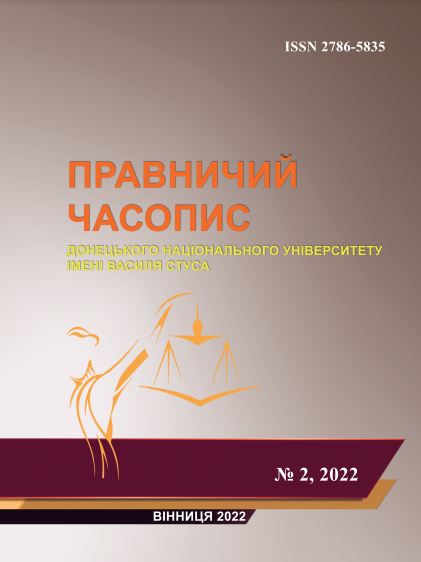Law Enforcement Discretion in the Plane of Social Crisis Theory
DOI:
https://doi.org/10.31558/2786-5835.2022.2.4Keywords:
law enforcement discretion; social crisis; judicial discretion; judicial practice; human rights; protection of rights and legitimate interests; qualification; legal awarenessAbstract
The purpose of the scientific article is to analyze the boundaries of law enforcement discretion in the plane of the theory of social crisis.
It is concluded that the current situation in Ukraine fully corresponds to the essence and signs of the social crisis. In such conditions, the individuals need for stability, for the state’s sense of concern for its rights and their protection, is particularly acutely visualized.
It is stated that the existence of law enforcement discretion among state bodies and officials is aimed at taking into account non-standard situations and certain features of typical social relations. During social crises, the number of such enforcement cases increases exponentially, as new social conditions also produce new types of social conflicts. Therefore, during a social crisis, the existence of the institution of law enforcement discretion can equally help to establish the principle of the rule of law, the protection of human and civil rights and freedoms, and finally discourage a person in the functioning of state and legal institutions.
Based on the method of legal comparativistics, the specifics of approaches to law enforcement discretion in different types of legal systems are revealed. In particular, the Anglo-Saxon legal family doctrinally substantiates the provisions on the need for the widest judicial discretion, which is due to the partial merger of law enforcement and law-making activities, as well as the peculiarities of the structure of the legal system and legal technology. For classical countries of the Romano-Germanic type of legal systems, as a rule, law enforcement discretion is much narrower, since the options of choice and the limits of discretion are fixed in the norms of statutory law. In the states of the post-Soviet type of legal systems, including Ukraine, the broad boundaries of law enforcement discretion contain significant risks due to the low level of legal awareness of subjects of power, so the limits of discretion should be clearly defined, and the options should be specified.
It is emphasized that in the context of a social crisis, the shortcomings of the institution of law enforcement discretion only worsen, so the possibilities of discretion should be minimized in cases where this creates risks of violation of human rights and freedoms.
References
Берзон С. Ю. Теоретичні засади формування поняття «соціально-економічна криза». Нобелівський вісник. 2020. № 1(13). С. 6–12.
Паращевін М. А. Криза соціальна. Енциклопедія Сучасної України: електронна версія ред.: І. М. Дзюба, А. І. Жуковський, М. Г. Железняк та ін.; НАН України, НТШ. Київ: Інститут енциклопедичних досліджень НАН України, 2014. Т. 15. URL: https://esu.com.ua/ article-965
Суший О. В. Націєтворчий процес у координатах соцієтальної кризи в Україні. Наукові студії із соціальної та політичної психології. Вип. 43(46). С. 7–19.
Лікарчук Н. В. Кризи в системі державного управління: причини виникнення та шляхи регулювання. Право та державне управління. 2020. № 4. С. 256–261.
Резанов С. А. Дискреційні повноваження як корупційні ризики в діяльності органів державного управління. Право і Безпека. 2014. № 3. С. 88–91.
Шатрава С. О. Дискреційні повноваження працівників ОВС, як корупційний ризик в діяльності органів внутрішніх справ. Порівняльно-аналітичне право. 2013. № 2. С. 276–277.
Лагода О. Основні помилки у застосуванні дискреційних повноважень посадовими особами адміністративних органів. Право України. 2009. № 3. С. 20–24.
Булгакова І. В. Судовий розсуд у господарському процесі. Вісник Академії адвокатури України. 2005. Вип. 3. С. 44–49.
Spengler J. Mashine-Made Justice some Implications. New York, 1963.
Міхайліна Т., Жердєв О. Дискреційні повноваження та правосвідомість суб’єкта правозастосування: аспекти співвідношення. Economic and law paradigm of modern society. 2018. № 1. С. 71–80.

